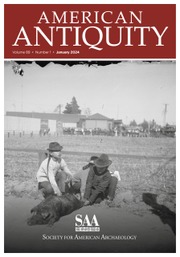Article contents
Additional Data on Crania from the Warren Mounds, Utah
Published online by Cambridge University Press: 25 January 2017
Extract
Since publication of the manuscript “Crania of the Warren Mounds and their Possible Significance to Northern Periphery Archaeology,” it has become necessary to call to the reader's attention important data overlooked in the original report by both Mr. Enger and myself.
As was stated in the general summary of the Warren crania, “The Warren crania have the following characteristics: cephalic index, brachycephalic; height-length index, chamaecephalic fo orthocephalic; height-breadth index, tapeinocephalic; facial index, mesene; high orbits; a fairly well-developed occipital region; and no occipital deformation.” It is this last descriptive statement which, in view of recent studies, is in need of elaboration.
- Type
- Facts and Comments
- Information
- Copyright
- Copyright © The Society for American Archaeology 1949
References
- 1
- Cited by


